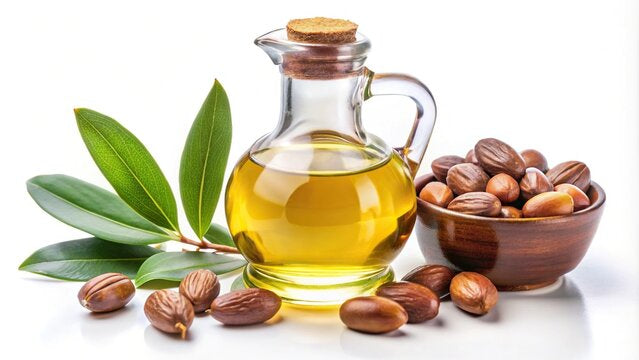Herbal Manetenance Ingredients
Jojoba Oil
Jojoba Oil
Simmondsia chinensis
Composition
Composition
- Wax Esters: The dominant component, making up almost 98% of the total composition.
- Free Fatty Acids: Small amounts of free fatty acids are present.
- Alcohols: Included in the wax ester structure.
- Hydrocarbons: Present in small amounts.
- Triglycerides: Found in only a tiny fraction of the total composition.
- Sterols: Present in small amounts.
- Vitamins: Including Vitamin E.
- Fatty Acids: Jojoba oil contains a variety of fatty acids, including gadoleic acid, erucic acid, oleic acid, palmitic acid, palmitoleic acid, stearic acid, and behenic acid.
Jojoba oil's unique composition, particularly the high content of wax esters, gives it properties similar to human sebum and makes it well-suited for skincare and other cosmetic applications.
Origins
Origins
Jojoba (Simmondsia chinensis) is native to theSonoran Desert, which spans parts of southern California, Arizona, and Baja California in Mexico.It's a desert shrub that thrives in arid environments with low rainfall and extreme temperatures.
Did you know?
Did you know?
Jojoba oil, often referred to as liquid wax due to its unique composition, offers a sustainable alternative to sperm whale oil, which has had a significant impact on reducing the need for whaling. Composed primarily of wax esters, along with minor components like free fatty acids, alcohols, hydrocarbons, sterols, and vitamins, jojoba oil mimics the properties of the oil once derived from sperm whales. This likeness has made it a valuable ingredient in the cosmetics industry, where it is prized for its moisturizing and emollient qualities. By providing a plant-based substitute, jojoba oil not only supports wildlife conservation but also offers a versatile and eco-friendly option for personal care products. Its adoption underscores the potential of sustainable resources to replace animal-derived ingredients while promoting environmental stewardship.
Share

Collapsible content
HAIR BENEFITS
Hair Strength and Health:
- Strengthening hair:Jojoba oil can fortify hair strands, reducing breakage and split ends.
- Scalp health:It can soothe an itchy scalp, reduce dryness, and minimize the appearance of dandruff.
- Prevents hair loss:By nourishing hair follicles and promoting overall hair health, jojoba oil can help prevent hair loss.
- Promotes hair growth:Jojoba oil can stimulate circulation in the scalp, nourishing hair follicles and promoting healthy hair growth.
Moisturizing and Conditioning:
- Moisturizes dry hair: Jojoba oil has excellent moisturizing properties, helping to rehydrate dry hair and reduce frizz.
- Adds shine and luster: It can leave hair looking healthy and radiant.
- Reduces frizz and flyaways: Jojoba oil can help smooth and tame hair, reducing frizz and flyaways.
- Protects hair from damage: It creates a protective barrier on the hair, helping to shield it from environmental stressors like pollution and UV rays.
Other Benefits:
- Reduces hair tangling: Jojoba oil's lubricating properties can make hair easier to detangle and reduce breakage.
- Easy to use: Jojoba oil can be applied directly to hair, mixed with shampoo or conditioner, or used as a deep conditioning treatment.
- Natural and gentle: Jojoba oil is a natural oil with a light texture and virtually odorless
SCALP / SKIN BENEFITS
Scalp Benefits:
- Moisturizing and Hydration:Jojoba oil is a natural moisturizer that helps to hydrate the scalp, relieving dryness, itchiness, and flakiness.
- Balancing Oil Production:Jojoba oil closely resembles the natural oils (sebum) produced by the skin, which can help balance oil production and prevent excessive oil buildup on the scalp.
- Reduces Inflammation:Jojoba oil has anti-inflammatory properties that can help soothe irritated scalps and reduce redness, making it a good choice for conditions like scalp eczema and psoriasis.
- Treats Dandruff:By providing hydration and reducing inflammation, jojoba oil can help alleviate dandruff symptoms, such as flaking and itching.
- May Promote Hair Growth:Jojoba oil can create a healthier environment for hair growth by addressing dryness, inflammation, and potential infections.
Skin Benefits:
- Moisturizing and Softening:Jojoba oil is an excellent moisturizer that can help to soften and hydrate various skin types, including dry, oily, or sensitive skin.
- Balancing Oil Production:Similar to the scalp, jojoba oil can help balance sebum production, reducing the risk of acne and clogged pores.
- Anti-inflammatory:Jojoba oil's anti-inflammatory properties can help soothe skin irritations, redness, and inflammation, making it a good choice for conditions like eczema and rosacea.
- Treats Skin Conditions:Jojoba oil can help manage various skin conditions, including acne, eczema, psoriasis, and dry skin-related symptoms.
- Anti-aging:Jojoba oil's rich vitamin E content and antioxidant properties can help fight free radical damage and improve skin elasticity, smoothness, and firmness, promoting a more youthful appearance.
Other Benefits:
- Hair Follicle Cleaning:Jojoba oil can penetrate into hair follicles and help to clean out sebum buildup, which can improve hair health and reduce hair loss.
- Hair Strengthening:Jojoba oil's moisturizing and nourishing properties can help strengthen hair, reduce breakage, and prevent split ends.
- Hair Growth Support:By addressing scalp health and providing essential nutrients, jojoba oil can create a more favorable environment for hair growth.

